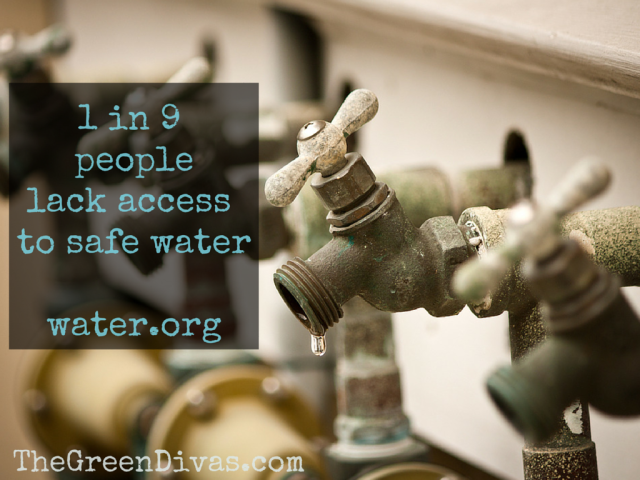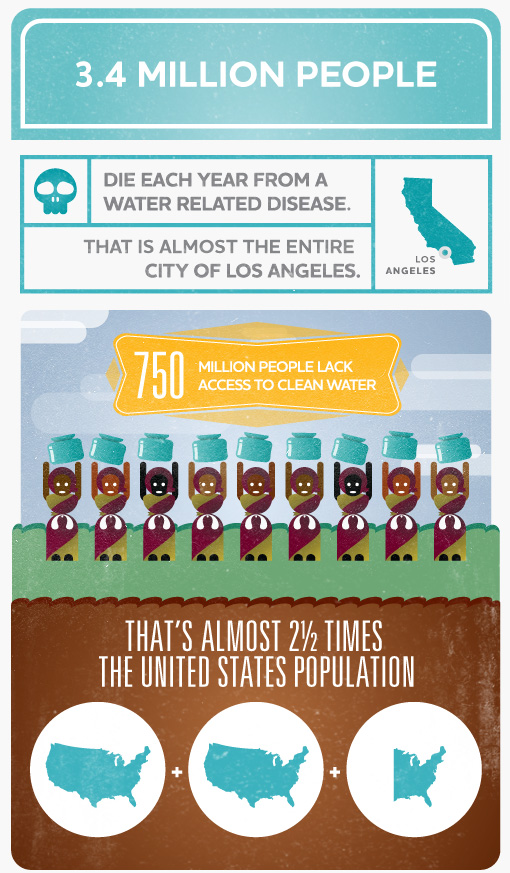
While World Water Week took place in the fall of 2014, water issues and solutions should be recognized daily. ~ Ed.
Water & Energy Demands Outpace Resources. Again.
We don’t have enough—water and energy demands just keep rising.
When Mr. Kandeh Yumkella, United Nations Under-Secretary for Sustainable Energy for All said “three billion people will move to the middle class by 2030,″ demanding 50-60 percent more energy, 35 percent more water and 40 percent more food at the Stockholm World Water Week, I could relate to the facts and figures absolutely!
I come from a country with a population of about 170 million people and a huge number of these people need food, water and energy to thrive.
According to World Bank figures, 6 out of 10 Nigerians have no access to clean water, 4 out of 10 have access to electricity, which is not by any means constant, and about 4 out of 10 Nigerians live below the poverty line.
This is as a result of a failed and corrupt system.
Nigerians have also become their own government and water provider as potable water is not accessible in most cities and communities. Every building now comes with a borehole, and the worrying part is the fact that these boreholes are dug indiscriminately without any regulations or any appropriate body checking to ascertain the safety of the water considering the manner of activities peculiar to such an environment. There is also the likelihood of frequent and enormous water waste since there is no means of measuring the amount of water abstracted.
Food is also wasted following inefficient agricultural and storage methods, while the minute energy generated is wasted by a lack of energy conservation lifestyle by the people and the system. Nigeria is not the only country wasting some of these basic human requirements, many more countries are just as wasteful, but some are more wasteful than the others.

At World Water Week
Before I got to Stockholm, I had read about how eco-friendly Sweden is, ranking 9th in the world, compared to Nigeria, at 134, according to research by Yale University and Columbia University 2014 Environmental Performance Index of 178 countries. It was so evident, I literally saw minimalism as a lifestyle, sustained by strong commitment by the government .
I was lodged in a hotel, a huge and magnificent building but with surprisingly conserved room spaces. Perhaps a more shocking discovery was that this hotel had no reception. Everything was virtually managed from a totally different country. When you finally pick a phone placed by the entrance for desperately needed help, you will have to answer a very weird question—“what country are you calling from?”
I have a belief that in the future, guests might not find a kitchen, one would have to Google food, with mouth wide open to receive some virtual food. Lighting had sensors and only comes on when some form of activity is detected. The rooms got cleaned once in five days, but there are clean towels and sheets reserved in a storage that doubled as settee and extra bed.
It was all planed to conserve energy, water, and money. And of course the internet connection was perfection. Nothing less for a hotel of the future.
From my window, I saw a truck picking up trash from the hotel’s kitchen, it had this inscription: “Sort out your leftovers—they become biogas.” Sweden leaves nothing to waste. 99 percent of their waste is recycled, in fact they now import waste for energy. Yes, they are that good at sustainability.
Sustainability
World Water Week is a gathering of leaders in the water industry every year in Stockholm. This year, water and energy were on the table, a more sustainable way of improving water and energy access, has become crucial.
Countries like Nigeria are finding means to make use of its enormous water resources for the benefits of the people and therefore building more dams. While some believe countries should stop building dams, nations in need of energy insist that they must use their water resources, just as developed nations have, but must be built in a sustainable manner.
Nigeria’s Minister of Water Resources, Sarah Ochekpa who was at the conference said “We have found that hydro produces one of the cleanest sources of energy and it is affordable hence the decision of the Federal Government to construct dams and deploy them for power generation, using best practices.”
Nigeria is presently constructing a dam costing 1 billion dollars to be ready by the end of 2014. The Kashimbilla multipurpose dam, when completed, is expected to generate 40MW hydro power to provide water to about 400,000 people while irrigating about 2000 hectares of farmland.
“There are also ample provisions for fisheries development, tourism and provision of water for sustenance of the environment and for downstream residents. 8000 people will employed for rapid urbanization and reduced migration.” Reginald Ikpeawujo, Director, Dams and Irrigation at the Ministry of Water Resources said.
 Investing in Energy and Water Projects
Investing in Energy and Water Projects
Sweden is a an example in the use of hydroelectric power plants to generate electricity, having done this for more than 100 years. Godsknows Igali, Permanent Secretary, Ministry of Power and former Nigerian ambassador to Sweden says, “It will be good if the Swedish government and private companies can look towards Nigeria for dams that would support power generation, agriculture and water. The recent power sector reform was transparent, with good scope and contest, so we are open to new investors.”
But Paul Beers of Fair Water Foundation, says he isn’t quite interested in doing business in Nigeria, “It could take 2-3 years to know who to trust. Total waste of time. Corruption is too much, and there is no maintenance culture.” Fair Water develops and implements professional innovations to fight poverty by making safe water for the people in rural Africa more reliable and affordable.
Despite his belief, lots of foreign businesses and NGO’s are working in Nigeria. While waiting for my train back to my hotel, I met John Etgen, senior Vice President for Project WET. He told me WET is already working in Nigeria.
Project WET (Water Education for Teachers), is a global water education program that facilitates and promotes awareness, appreciation, knowledge, and stewardship of water resources through the dissemination of classroom-ready teaching aids to reach children, parents, teachers and community members. The organization is working presently in two states in Nigeria. Currently, a total of 3,124 students and 87 teachers at 25 schools are reached by Project WET in Lagos State.
My job is to share stories of people working for a planet in harmony, as individuals or organizations. I believe it’s a duty to keep our environment healthy and safe for our children, and sustainable water, energy and food should be top on the list.
The next World Water Week is in Stockholm August 23–August 28 2015. Find out how to get involved here.
BONUS:
Listen to this Green Divas myEARTH360 Report podcast for more details from World Water Week…
Listen to more of The Green Divas and other green and healthy living programs at GDGDRadio.com!
[dynamic-sidebar id=’Custom Widget 2′]
~Asst. Ed. Green Diva Christine